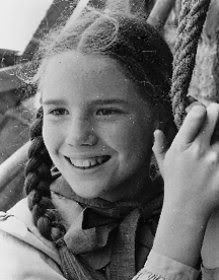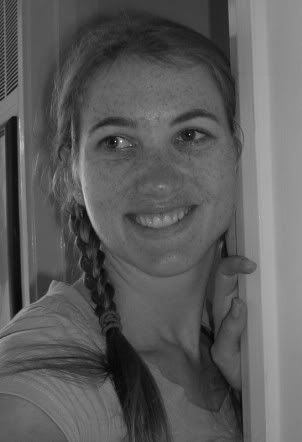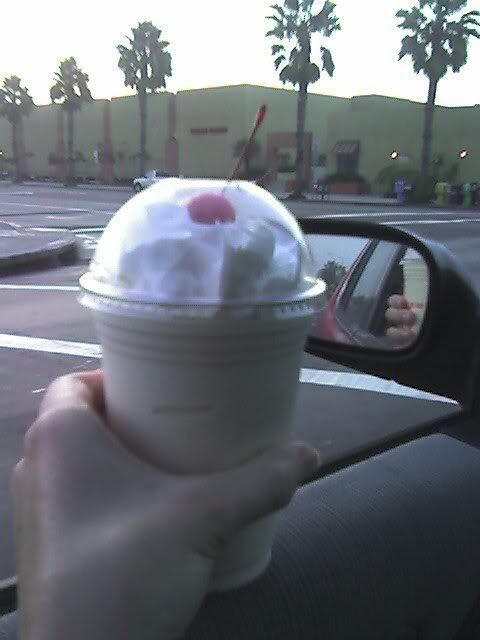In Memoriam
On Saturday night, one of my classmates from medical school died.
She was in her intern year, like me. Doing med-peds, like me. Blonde, like me. We had the same big sib in the class ahead of us. She was AOA, like me. She thought she might have gone into adolescent medicine, like I might. She got her top choice residency, like me. She'd just gotten married. Her life seemed to be everything she wanted. And now it's over.
She was on call at Children's when she died. She was in the call room. The nurses kept paging her and she didn't answer. Finally her resident went up to check on her and found her "unresponsive" (medical lingo for dead). Still, they tried to bring her back. Other interns from my class had to code her. For forty-five minutes they tried. I imagine they put in lines, intubated, did chest compressions. But she never came back.
She had just been married earlier this past summer. She'd been with her boyfriend forever. I remember the day we ran into each other at work and I noticed the ring for the first time. She'd just gotten engaged and told me the whole story. She was glowing. She usually did, though. She has this funny smile into uncomfortable-sounding laugh that she did.
I guess her husband and parents came to the hospital; they were freaking out. Police were there. It must have been unthinkable. Surreal in the worst way.
It was when I heard about it. My friend S. texted me and I got it when I got off the plane back in San Diego. I called her back but she said to wait and talk when I was in my car. Something was wrong. Then J. called me, too. He said he had to tell me something, too. "Something happened here in Cincinnati," he said. He wanted me to wait until I was alone, too.
I called when the shuttle dropped me off at my car. "You know xxxx xxxx?" "Of course." And he told me the news. How? So young? So much work. So much life ahead of her. So much promise. So many things not done. So young.
When I talked to S. later, I told her I already knew. She filled in some blanks. I guess she had a brain tumor diagnosed in our first or second year of med school. It was slow growing so they didn't do anything. But she had a secondary seizure disorder from it. Maybe she had a seizure, in her call room, alone. Then she would have vomited and inhaled her vomit and choked on her own gastric contents. Maybe that's what happened. They have/had to do an autopsy. The pathologists who taught us for four years now have to do an autopsy on her. On her. On one of our own.
This morning as I left grand rounds to come home for a bit before returning the VA urgent care, I heard a story about "Marine Cpl. Kyle W. Powell" who had been killed in Iraq by a roadside bomb. He was 21. His boyscout leader was proud of him; didn't want him to die, but said there was no better way to die than serving your country. He was 21! He was young, strong, healthy, a leader, a brother, a son, a fine person. He had a life ahead of him that did not include this. His family is proud, too, though. They love him. They miss him.
It's all a big jumble in my head, of youth and death and promise gone and futures lost and pasts glorified and life. On one of my past entries, someone wrote that, as a doctor we witness the the brilliant candle of someone else's life flicker and fade.
What about when that flame is so bright and it doesn't flicker, it just stops. Mid-flame. It's just gone.
If she hadn't been sleep deprived, would she have had the seizure? If she hadn't been on call, would her husband have been beside her and been able to save her? If she hadn't been alone?
Would she have chosen to spend the last years of her life studying the Krebs cycle in the library? Sacrificing late nights with her boyfriend, now husband, to cram for the next test? Spending nights at the hopstital with sick patients instead of at home with her own love, or her own family?
These are decisions we make based on the promise of a future result. They are plans for the future. It's not fun to study the Krebs cycle, but it gets you where you want to go. What if you never get there, though? What if you're gone before you get to where you want to go, and all you have left is that time that you spent planning and working toward a future that will now never be.
Her husband is probably 26; and now he's a widower. He parents are in their 50s and they've lost a daughter, one whom they loved, one who they'd watch grow and learn and work and work and work toward her goal of being a doctor.
She was always fun on a night out. We were out once celebrating something and she told me a story once about a guy hitting on her (he was still there, so it was sort of a warning, really). She had to have a guy friend (who is probably gay but doesn't know it) pretend to be with her and the would be creep of a suiter asked is he were "tappin' that ass?" The moments that make up a life. Moments you remember.
I keep trying to wrap my mind around it. But I can't.
I finished a book recently, "Suzanne's Diary for Nicholas." I was sobbing nearly hysterically by the end. Suzanne died. Her one year old son died. Her husband, who'd found the love of his life then lost her, was flattened. Suzanne had a heart condition that she told him about early on, but he already knew, he loved her anyway. "Isn't it lucky that Suzanne didn't die when she had her heart attack. Isn't lucky that we have this time together?." And then they had a new catch phrase to share and love and pour more of their overflowing love into: isn't it lucky.
Isn't it lucky that Sarah lived for a while. Isn't lucky she touched patients lives. Isn't it lucky that we knew her. Isn't it lucky that she was happy. Isn't it lucky that she and her husband were so in love, if not long enough, at least for that time. Isn't it lucky?
I don't know if it's lucky or not.
It just is.

That's her behind me, at graduation. Looking to her right. Looking forward.
She was in her intern year, like me. Doing med-peds, like me. Blonde, like me. We had the same big sib in the class ahead of us. She was AOA, like me. She thought she might have gone into adolescent medicine, like I might. She got her top choice residency, like me. She'd just gotten married. Her life seemed to be everything she wanted. And now it's over.
She was on call at Children's when she died. She was in the call room. The nurses kept paging her and she didn't answer. Finally her resident went up to check on her and found her "unresponsive" (medical lingo for dead). Still, they tried to bring her back. Other interns from my class had to code her. For forty-five minutes they tried. I imagine they put in lines, intubated, did chest compressions. But she never came back.
She had just been married earlier this past summer. She'd been with her boyfriend forever. I remember the day we ran into each other at work and I noticed the ring for the first time. She'd just gotten engaged and told me the whole story. She was glowing. She usually did, though. She has this funny smile into uncomfortable-sounding laugh that she did.
I guess her husband and parents came to the hospital; they were freaking out. Police were there. It must have been unthinkable. Surreal in the worst way.
It was when I heard about it. My friend S. texted me and I got it when I got off the plane back in San Diego. I called her back but she said to wait and talk when I was in my car. Something was wrong. Then J. called me, too. He said he had to tell me something, too. "Something happened here in Cincinnati," he said. He wanted me to wait until I was alone, too.
I called when the shuttle dropped me off at my car. "You know xxxx xxxx?" "Of course." And he told me the news. How? So young? So much work. So much life ahead of her. So much promise. So many things not done. So young.
When I talked to S. later, I told her I already knew. She filled in some blanks. I guess she had a brain tumor diagnosed in our first or second year of med school. It was slow growing so they didn't do anything. But she had a secondary seizure disorder from it. Maybe she had a seizure, in her call room, alone. Then she would have vomited and inhaled her vomit and choked on her own gastric contents. Maybe that's what happened. They have/had to do an autopsy. The pathologists who taught us for four years now have to do an autopsy on her. On her. On one of our own.
This morning as I left grand rounds to come home for a bit before returning the VA urgent care, I heard a story about "Marine Cpl. Kyle W. Powell" who had been killed in Iraq by a roadside bomb. He was 21. His boyscout leader was proud of him; didn't want him to die, but said there was no better way to die than serving your country. He was 21! He was young, strong, healthy, a leader, a brother, a son, a fine person. He had a life ahead of him that did not include this. His family is proud, too, though. They love him. They miss him.
It's all a big jumble in my head, of youth and death and promise gone and futures lost and pasts glorified and life. On one of my past entries, someone wrote that, as a doctor we witness the the brilliant candle of someone else's life flicker and fade.
What about when that flame is so bright and it doesn't flicker, it just stops. Mid-flame. It's just gone.
If she hadn't been sleep deprived, would she have had the seizure? If she hadn't been on call, would her husband have been beside her and been able to save her? If she hadn't been alone?
Would she have chosen to spend the last years of her life studying the Krebs cycle in the library? Sacrificing late nights with her boyfriend, now husband, to cram for the next test? Spending nights at the hopstital with sick patients instead of at home with her own love, or her own family?
These are decisions we make based on the promise of a future result. They are plans for the future. It's not fun to study the Krebs cycle, but it gets you where you want to go. What if you never get there, though? What if you're gone before you get to where you want to go, and all you have left is that time that you spent planning and working toward a future that will now never be.
Her husband is probably 26; and now he's a widower. He parents are in their 50s and they've lost a daughter, one whom they loved, one who they'd watch grow and learn and work and work and work toward her goal of being a doctor.
She was always fun on a night out. We were out once celebrating something and she told me a story once about a guy hitting on her (he was still there, so it was sort of a warning, really). She had to have a guy friend (who is probably gay but doesn't know it) pretend to be with her and the would be creep of a suiter asked is he were "tappin' that ass?" The moments that make up a life. Moments you remember.
I keep trying to wrap my mind around it. But I can't.
I finished a book recently, "Suzanne's Diary for Nicholas." I was sobbing nearly hysterically by the end. Suzanne died. Her one year old son died. Her husband, who'd found the love of his life then lost her, was flattened. Suzanne had a heart condition that she told him about early on, but he already knew, he loved her anyway. "Isn't it lucky that Suzanne didn't die when she had her heart attack. Isn't lucky that we have this time together?." And then they had a new catch phrase to share and love and pour more of their overflowing love into: isn't it lucky.
Isn't it lucky that Sarah lived for a while. Isn't lucky she touched patients lives. Isn't it lucky that we knew her. Isn't it lucky that she was happy. Isn't it lucky that she and her husband were so in love, if not long enough, at least for that time. Isn't it lucky?
I don't know if it's lucky or not.
It just is.

That's her behind me, at graduation. Looking to her right. Looking forward.




